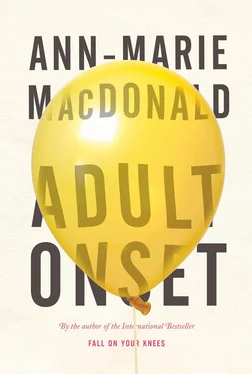“I have to go, Mum.” She hangs up. “Daisy”—outdoor voice—“get in here!”
Daisy comes, grinning, body slung low in shame. Mary Rose waves to the Canada Post guy, but he speeds off in his van. Uncharacteristically, and perhaps against regulations, he has dropped his delivery on the flagstone walk: a sizable package. The packeege! It has teeth marks in it — Daisy didn’t actually bite the mailman, did she? Closer inspection reveals it is not from her mother. L.L. Bean , reads the label. Sticking the phone in her back pocket, she picks up the box, rapturous— O sweet mystery of life at last I’ve found you! — and carries it to the porch where she intercepts Maggie who is making for the four-foot drop over the side. Mary Rose grabs her by the arm and Maggie screams. One hand on her child, the other balancing the box, she struggles with the screen door and sees from the corner of her eye that the lid of the rain barrel, which stands flush against the porch, is loose and missing its bolt — she flashes on an image of Maggie floating face down in the dark water. She tightens her grip and is rewarded with a kick — she will get out there this afternoon, while Maggie naps and Matthew builds a Brio train bridge, and fix the thing. And once she has given up trying to fix it with the one tool she is capable of wielding, namely duct tape, she will call someone in to fix it … what’s the name on the side of that van she keeps seeing in the neighbourhood? Rent-a-Husband? She will do all this right after she has called the chimney guy and got him to come at the same time as the furnace guy, filled out a “simple” form for Canada Revenue Agency, booked her mammogram and phoned her mother back. How does anyone manage to keep a child alive in this world of distractions?
In the kitchen, she lets Maggie help open the parcel for as long as she can stand it, then takes the scissors from their niche in the knife block. She loves these scissors; she bought them from a shopping channel in her room at the Fort Garry Hotel out west in Calgary on her last book tour, the only scissors you’ll ever need! She kneels, slits open the box … and beholds within the ingenious foolproof Christmas tree stand she ordered. She lifts it from its foam core nest, taking a moment to admire the smooth green dome, its ergonomic clamps poised to bite into a freshly trimmed trunk. Unlike the disaster-prone stands of her childhood, it has a stable base, a patented easy-tilt mechanism and built-in water reservoir. She shakes off the pang of disloyalty that accompanies her pride in having surpassed her own father and an entire generation of family men who sweated and swore under their breath through so many festive seasons, and heads back down the hall with it. She slips through the baby gate, locks it behind her — more protests — and carries the stand lovingly all the way up to the attic, where she places it in an easily accessible spot, knowing that even though they’ll use it but once a year, she’ll thank herself every time she doesn’t have to fight her way through a ton of junk to haul it out, cursing, hot, hurt and exhausted. Mary Rose MacKinnon has a Christmas tree stand that works and is effortlessly accessible. She has that house. She has that attic. She has that life.
She listens as the protests subside two floors below, confident there is nothing down there that can harm Maggie in the minutes she will be absent, having thoroughly childproofed their home.
•
The contractions are faint, it is taking too long, that can be dangerous, so they induce. They put the pit drip in her arm and rig a surgical curtain so she won’t see and she goes into labour.
They make the delivery easier on her by compressing the infant’s skull — she is not a big woman, there is no need for her to tear. She is a nurse, she knows what they do. They had wanted to do it to her first baby, born breech way down east in Cape Breton; remove it limb by limb in order to save the mother, “That’s what we would do in my country,” said the West Indian nurse. But the young mother said, “Save the baby.” She requested a priest, who came and administered to her the Sacrament of Extreme Unction. But mother and daughter both survived. “Traumatic Parturition.” She saw it scribbled on her chart.
This baby, however, has been dead for weeks. She knew something was wrong from the start. When she first found out she was pregnant again so soon, she felt guilty for not being happier. She confessed to the priest, who told her it was normal to miss her own mother at a time like this but that God never sends us more than we can bear. He absolved her, but she was unable to shake the bad thoughts: If only God had waited till I was less tired. If only Mumma weren’t so far away. If only I weren’t pregnant …
When she told the doctor she thought something was wrong, he said, “Don’t be silly,” but since she had come all the way into Winnipeg, he might as well examine her. He laid the cold metal disc on her belly and listened. He moved the disc. He moved it again. He listened, but could not find a heartbeat. He threw down his stethoscope and walked out without a word. She got off the table, collected her mouton coat and told the receptionist, “I think he’s really disgusted with me.”
Now she wonders, did she have bad thoughts because the baby was dead? Or was it the other way around?
Behind the curtain, no one speaks above a whisper. They have given her a sedative, but she is awake and able to push. It is big, the way blue babies often are. It does not take long. She feels a tugging. Then it is gone, and she is empty.
A rustling sound … sound of fabric, the nurse is wrapping it up. Soft-soled footsteps retreat. They take it away.
•
Upon descending the stairs, Mary Rose meets with a remarkable sight: in the living room, Maggie, her back to the doorway, is sitting still, engaged in some kind of fine-motor activity obscured from view. She must be in the midst of a developmental surge. Nearby, Daisy is innocently nibbling her paw and avoiding Mary Rose’s gaze — she is a dear old thing, if a little impulsive and, like the best dogs, endlessly shame-absorbent. Pit bulls are banned in Ontario, but Daisy is “grandfathered”: having been born before the law came in, she is permitted to live but may be summarily executed if deemed a danger. As it is, she must be muzzled in public, a law Mary Rose feels befits more the authors of the legislation than the dogs themselves.
Daisy was her name when they got her from the Toronto Humane Society — they were going to change it to Lola, but one look at her eight tired teats told them she’d been through enough. She is a tawny, brawny American Staffordshire terrier of indeterminate elderliness who snores louder than Mary Rose’s late Aunt Sadie and lives in terror of having her nails clipped. Her skull is the shape of a World War II German army helmet. Her anal glands need to be expressed every few months by the vet, an effect of her having borne so many puppies. She dozes on her belly in the midst of screeching birthday parties, legs splayed like a pressed quail. She looks like Mickey Rooney when she smiles. If the vet doesn’t express her anal glands, she drags her butt across the carpet till they express themselves.
She watches now as Daisy rolls onto her side and stretches out behind Maggie, providing her with a backrest. Lovely — as long as Maggie doesn’t fall asleep, for there will go the morning nap. Hilary is all for letting go of said nap, arguing that Maggie will sleep better at night. Mary Rose thought, but did not say, “You mean you’ll sleep better. What about me with a cranky toddler all day?”
Like every other room in the house, the living room is a hazard-free zone — unless one counts Maggie as a hazard. Just last week, Mary Rose fitted the coffee table with a shock-absorbent expandable table-edge bumper (which Hil is sure to remove when she returns) while on the table are harmless objects — books mostly, plus a neat stack of the New York Review of Books that Mary Rose is saving for when she has time or bronchitis, which amounts to the same thing. She will savour them through a haze of antibiotics once Hil is home and she can afford to get sick. On the carpet is a vectoring network of Brio train tracks where Thomas and his variously smiling and scowling friends are coupled up waiting for Matthew’s return — he will know if one is out of place. But Maggie shows no sign of robbing the trains or blowing up the tracks — all quiet on the western front. Mary Rose takes the chance and steals back to the kitchen.
Читать дальше












